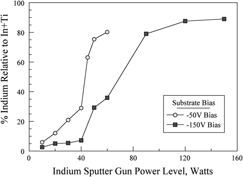No CrossRef data available.
Published online by Cambridge University Press: 07 November 2011

TiN–indium composite films were deposited by simultaneous sputtering of titanium and indium in a mixed Argon/Nitrogen atmosphere and characterized for tribological applications. Film compositions showed a nonlinear behavior as a function of sputter gun power. For films deposited at −50 V bias, and containing less than 29 relative percent indium, the films had a face centered cubic structure, but at higher indium contents (63–82%) the structure was not consistent with either TiN or indium. At −150 V bias, the films had either the TiN structure, In-type structure, or a mixture of the two. Atomic force microscopy images showed the formation of semispherical drops on the surface of the samples deposited at −50 V bias voltage, whereas at −150 V bias voltage the samples exhibited a smooth coating surface with occasional ellipsoidal blisters. Nanoindentation test of the films shows low hardness (5–12 GPa), but tribological testing showed that frictional behavior can be improved by moderate heating before testing, suggesting indium segregation to the surface.